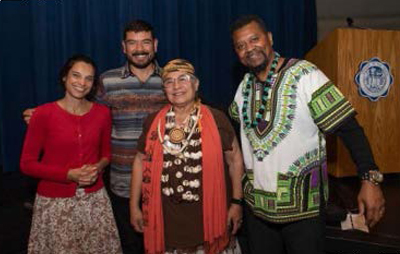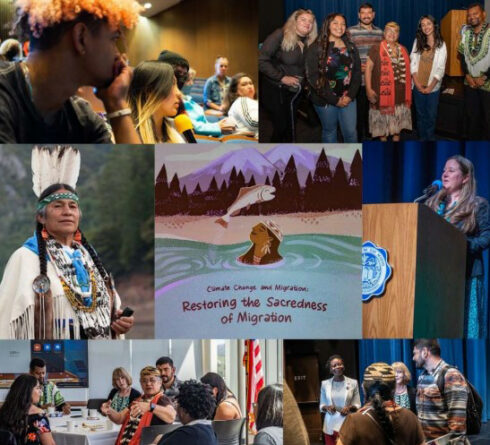
College of San Mateo Ethnic Studies Professors pictured with Chief Caleen Sisk. From left to right: Malathi Iyengar, Edgar Mojica Villegas, Chief Sisk, and Frederick Gaines.
As part of College of San Mateo’s Earth Day activities and the launch of a new Sustainability as Social Justice Committee, a special two-part sustainability event was held on April 24 and 25, 2023. The first event was a film screening of Dancing Salmon Home, “a 60-minute documentary covering the Winnemem tribe’s historic journey to reunite with their Chinook salmon relatives and call them home.” The second day welcomed Chief Caleen Sisk and her delegation from the Winnemem Wintu Tribe to speak to the campus community.
Chief Sisk has been a champion for environmental protection and sustainability with a distinctive vision and perspective that centers on Indigenous peoples’ struggles and experiences. During her talk, Chief Sisk discussed Mount Shasta, considered one of the 20 “mother mountains” on earth and the original homeland of her people, the Winnemem Wintu.
She explained how her people used to live by the McCloud River’s watershed but were forced out through colonization development and natural resource extraction. She also noted that chinook salmon were abundant when the Winnemem Wintu resided in the area. But after the Shasta Reservoir was built, the salmon population decreased drastically while the number of hatcheries increased.
Chief Sisk brought a wealth of knowledge and experience from the recent UN Permanent Forum on Indigenous Issues, where 100 Indigenous leaders met for two weeks in New York. She shared how significant representation is and pointed out that it took until 2007 for Indigenous people to be included in the UN. College President Dr. Jennifer Taylor-Mendoza emphasized the college’s commitment to aligning the college’s work with Indigenous rights and creating community partnerships based on mutual support and growth. “We recognize the history of institutions of higher education abusing and exploiting Indigenous peoples—their cultures, knowledge, land. And we are committed to reflecting on and reconciling this history on our campus.”

These events created a supportive environment that encouraged students to learn, understand, and act on important issues. CSM recognizes that social justice and sustainability conversations are emerging on our campus, but they have long been integral to Indigenous peoples’ lives and cultures. CSM is committed to learning from these communities and was privileged to host Chief Sisk and her delegation as guests.
The Sustainability as Social Justice Committee will continue to explore the intersection of these issues next year with a focus on creating more opportunities for the community to engage and address issues of sustainability and environmental equity though events, curriculum development, and community engagement.